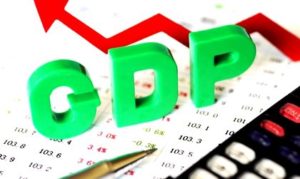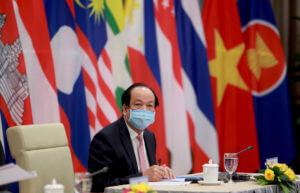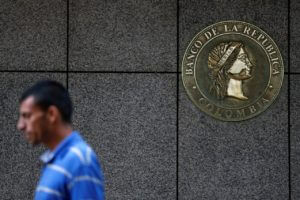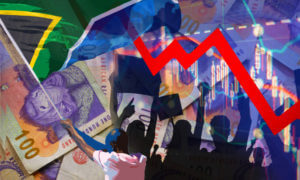A BUSY WEEK AHEAD, AGAIN.
Summer weeks are usually pretty dull, but not this year. With an eventful past week with a Fed meeting, Q2 GDP releases and President Trump’s unexpected out-of-the-box ideas, the week ahead is going to be just as packed and intense.
The latest GDP data in the US showed an unprecedented contraction (-32.9% in annualised terms) and indicated that five years of economic growth was wiped out in 2Q20. In order to support the economy, the Fed remains on an extraordinarily accommodative stance (for a long time) and will unlikely raise the interest rates for years. In the meantime, Chair Powell, again suggested that more fiscal support was needed to ensure a sustained economic recovery, but the Republicans and Democrats still appear to be far apart in the negotiations over the next economic relief bill. Due to the lack of consensus between the two parties, the USD 600 weekly unemployment benefit payments expired on Friday – posing further downside risk to the American consumer’s willingness and ability to spend.
On Friday, Fitch placed US government bonds (AAA rated) on negative outlook to ‘reflect the ongoing deterioration in the US public finances and the absence of a credible fiscal consolidation plan.’ On Sunday, the White House Chief of Staff stated that Presidential elections in the US would not be postponed and will be held on 3rd November, as opposed to President Trump’s tweets, which suggested otherwise during the week.
From a political point of view, investors will focus on domestic politics in the US (e.g. elections in November, the debate on the next economic relief bill etc.) as well as rising geopolitical tensions between the US and China this week. From an economic point of view, the July jobs report in the US should provide valuable insights on the health of the world’s largest economy, whilst manufacturing PMIs globally should help gauge the state of the world economy.

S&P 3,271 +1.73%, 10yr Treasury 0.54% -6.06bps, HY Credit Index 434 -20bps, Vix 25.73 -1.38Vol
Most major stock indices in the US gained during the week, despite the noisy events during the week (e.g. Q2 GDP release, President Trump’s unexpected ideas, the debate of a new round of economic relief measures, etc.). By the end of Friday, the S&P 500 rose 1.7%, whilst the Nasdaq Composite rose 3.7%. These gains may appear to some to be at odds with the underlying economic reality, the lack of visibility on the US Presidential elections, the absence of additional fiscal support and the increasing probability of a prolonged period of renewed lockdowns. These factors are captured to some extent by the yawning gap between the year-to-date gains of the tech-heavy Nasdaq Composite (+19.8% YTD at the end of August) and the small cap-biased Russell 2000 index (-11.3% YTD at the end of August). The DXY index declined 1.2% during the week, signalling a meaningful dollar weakness vs. other developed currencies such as the euro or the British pound. Meanwhile US Treasury yields sank, whilst the yield curve flattened by the end of the week (the 2-year yield declined 4bp to 0.11%, the 10-year dropped 6bp to 0.54%).
Economic activity declined in the US substantially in 2Q20, as real GDP contracted by 9.5% YoY (or by 32.9% in annualised terms, this value is quoted by many media outlets). Needless to say that, the extent of the economic weakness in 2Q20 was unprecedented and broad-based, wiping out five years of economic progress. The Chair of the Federal Reserve, Jerome Powell delivered a fairly downbeat assessment of the economy and noted the mounting downside risks to growth going forward.

Eurostoxx 3,195 -2.84%, German Bund -0.52% -7.60bps, Xover Credit Index 377 -31bps, USDEUR .850 -1.33%
Most European stock indices declined by the end of Friday: the Spanish index declined 4.5%, the Italian benchmark decreased 3.6%, the German DAX was down -2.8%, the French country index lost 2.2% and the UK’s FTSE 100 edged down 1.3% (all in USD). Volatility in European stock markets can be explained by the elevated uncertainty related to the second wave of infections, the fears of renewed period of lockdown and potentially prolonged nature of the Europe-wide economic woes.
GDP in the Euro Area declined 15% YoY in 2Q20, following a 3.1% contraction in the previous quarter. The Spanish (-22.1% YoY), French (-19% YoY) and Italian (-17.3% YoY) economies were very badly damaged due to the pandemic and the related lockdown measures. Relative to them, the German economy did not perform as badly, but the economic contraction was still very pronounced (-11.7% YoY).
CPI inflation in Poland slowed to 3.1% YoY in July, from 3.3% YoY in June, due to an unusually strong monthly decline in food prices. The Polish government foresees GDP growth at 4% in 2021 (vs. an expected decline of 4.6% in 2020) and CPI inflation at 1.8% (vs. 3.3% in 2020). The Polish government expects GDP growth to be mainly driven by domestic demand.

HSCEI 10,033 -0.39%, Nikkei 22,195.38 -3.36%, 10yr JGB 0.03% +0bps, USDJPY 105.730 +0.13%
Emerging Asian stock markets painted a mixed picture during the week. By the end of Friday trading, the Pakistani benchmark (+3.3% in USD) and the Chinese Shanghai Composite index (+4.2% in USD) were among the best performers, followed by the South Korean stock market (+3.7% in USD) and the Taiwanese benchmark (+3.3% in USD).
The official manufacturing PMI in China rose to 51.1 in July, from 50.9. The improvement was primarily driven by the continued strengthening of domestic demand. Meanwhile, the non-manufacturing PMI slightly eased, to 54.2 in July, from 54.4. The minor decline in the non-manufacturing PMI is related to a moderate deceleration in services activity growth, whilst construction activity remained robust.
The economic recovery in Vietnam persisted in July. According to the latest macroeconomic metrics, industrial production volume grew 1.1% YoY, whilst exports rose by 0.3% YoY – despite the weakness in global demand. Furthermore, retail sales increased 4.3% YoY in July, showcasing the resilience of domestic demand. However, the pace of return to the pre-pandemic growth trajectory might somewhat decelerate in the coming months, due to the reoccurrence of covid cases in Vietnam. After going three months without a single coronavirus case, over 40 new infections have been reported over the past week. The outbreak was reported in the city of Danang, although cases have also been registered in Hanoi and Ho Chi Minh. The authorities announced a full lockdown of Danang as well as new social distancing measures for the rest of the country, which should help contain the spread early on without posing significant downside risks to economic activity.
Taiwan’s GDP declined 0.7% YoY in 2Q20. Although this was the weakest quarterly economic performance since the Global Financial Crisis, it is still considered fairly strong in a regional context, where Hong Kong’s and Singapore’s respective GDPs declined by around 10% YoY in 2Q20. Taiwan’s economic outperformance is predominantly due to its success in containing the pandemic without the need for an economically-damaging nationwide lockdown.
It was announced that an MPC member, Mr. Setthaput would become the next governor of the Thai central bank. Mr. Setthaput serves as the Thai prime minister’s economic advisor and had previous roles at the Stock Exchange of Thailand, Siam Commercial Bank and the World Bank. It is likely that the incoming central bank governor will carry on the with the outgoing governor’s approach and thus conduct monetary policy in a similar manner going forward.
The Philippine President, Mr Duterte delivered his 5th State of the Nation Address in which he primarily urged Congress to pass several economic and healthcare bills. Economic policies would include emergency subsidy for workers, corporate income tax reduction, streamlining regulation to accelerate banks’ disposal of bad assets, loan payment holidays for SMEs, etc. The bill seeks USD 3.3bn of supplementary funds (ca. 0.9% of GDP).
A former Malaysian prime minister, Najib Razak, was found guilty of seven charges of abuse of power, money laundering and criminal breach of trust relating to misappropriate of funds from a government investment fund, 1Malaysia Development Berhad (1MDB). Mr. Najib denied all charges and is likely to appeal against the latest judgement. The verdict bars Mr Najib from contesting his parliamentary seat at the next election.

The Chilean stock market outperformed the majority of its regional peers, as the country’s benchmark index rose 2% in USD. Meanwhile, the Peruvian country index gained 1.5% in USD, whilst the Brazilian index went sideways (in USD terms) during the week.
According to the flash estimate, real GDP in Mexico declined by 18.9% YoY in 2Q20. The weakness in economic activity was broad-based, i.e. all sectors were negatively impacted by the suspension of non-essential activities in April and May. Industrial production was hit the hardest, as industrial output volume fell 26% YoY, followed by the contraction in services activity (-15.6% YoY). Since the beginning of the year, Mexico’s GDP shrank by 10.2% YoY.
President Vizcarra in Peru gave his annual Independence Day Address to the Nation, in which the President focussed on the coronavirus pandemic, the government’s strategy for economic recovery and his attempt to build a constructive relationship with the political opposition in Congress. The economic part of the speech hinted that the government has been working on a spending plan, which would help the post-pandemic economic recovery. The measures would include cash transfers to 8.5mn vulnerable households between August and October.
Industrial production in Chile declined 2.6% YoY in June (vs. -5.7% YoY in May). The contraction in industrial activity was primarily due to a fall in the output of food manufacturers (-8.3% YoY). As opposed to manufacturing, mining activity strengthened in June (+2.8% YoY).
In a unanimous decision, the central bank of Colombia cut its policy rate by 25 bps to 2.25%, a new low. The Monetary Policy Committee’s communiqué pointed to a more negative outlook for economic growth and unemployment.

Investor sentiment in the South African stock market turned negative during the week, which drove the TOP 40 index 1.9% lower in USD by the end of Friday. As opposed to the South African TOP 40, the Egyptian Hermes index delivered a strong performance, rising 1.7% in USD.
The IMF approved USD 4.3bn of emergency funding for South Africa through the rapid financing instrument. The loan will help ‘meet the urgent balance of payment needs stemming from the outbreak of the COVID-19 pandemic.’ However, the amount will cover less than 10% of the government’s funding need this year. The IMF’s loan approval will make it easier for South Africa to tap other concessional funding sources, on top of agreed loans of USD 1bn from the New Development Bank and ZAR 5bn from the African Development Bank. The Treasury and the central bank signed a letter of intent to the IMF, making a number of firm commitments to reforms and fiscal sustainability.
Egypt recorded a current account deficit of USD 2.8bn in 1Q20, which is a marked improvement from a year ago. The narrowing of the headline deficit was primarily due to an increase in remittances (+28% YoY). On a 4Q-rolling basis, the headline current account deficit amounted to a manageable 2.5% of GDP in 1Q20. Although the current account is likely to widen in following quarters, a high (enough) level of FX reserves, a firm commitment by the IMF and potential pick up in portfolio inflows will support Egypt’s external financial position.
The central bank of Kenya kept its policy rate at 7%. This was the third consecutive decision to keep the key rate stable following a cumulative 200bp worth of rate cuts since November 2019. The tone of the monetary policy statement was rather neutral with policymakers emphasising the uncertain nature of global financial markets.
This week’s global market outlook is powered by Alquity www.alquity.com




